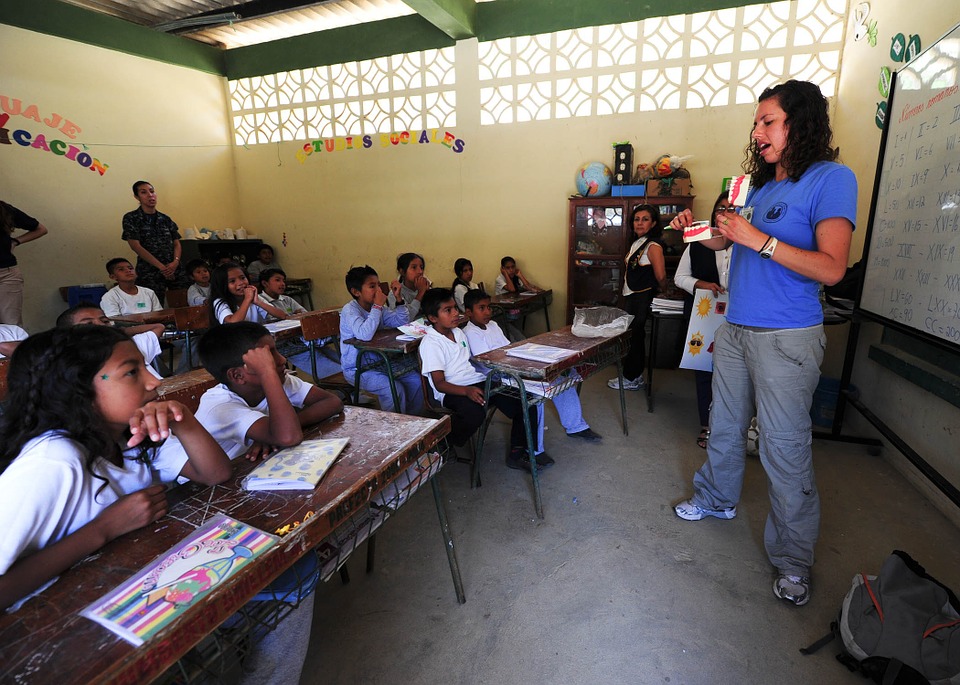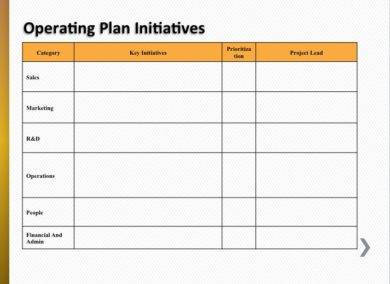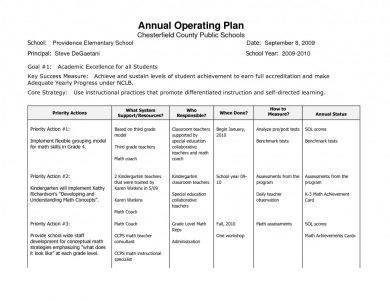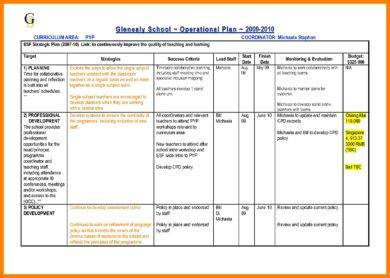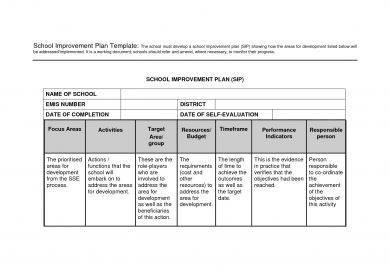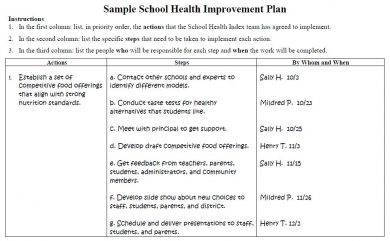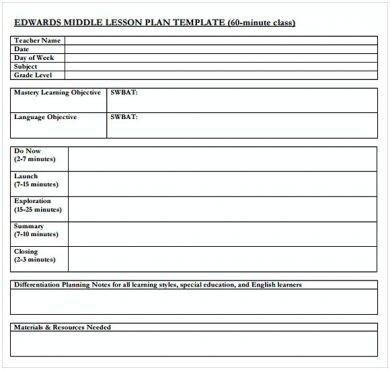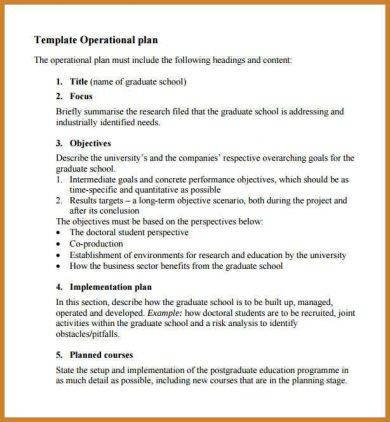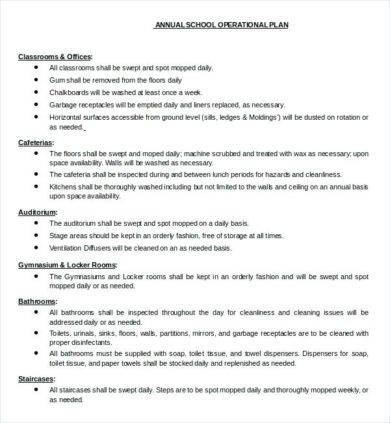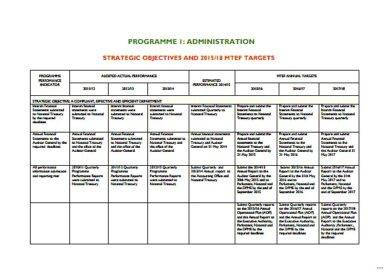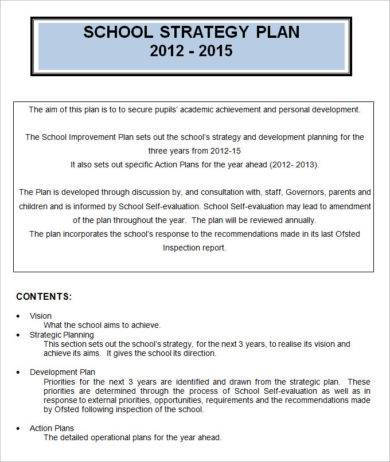Primary School Operational Plan
Primary school is where children obtain the most basic yet most important life skills and information. If they are not trained at a young age, they will never succeed in life and will have a hard time adjusting to life’s challenges. Your role as a primary school teacher is to instill knowledge to students through the use of a primary school operational plan.
To help you in creating your own operational plan, here are some primary school operational plan examples in PDF that you can use and download for free. We also included some tips on how to write your own primary school operational plan based on the example we provided.
School Operating Plan Initiatives Example
Public Primary School Operational Plan Example
Primary School Operational Plan Outline Example
The Importance of Operational Plans
The importance of operational plans cannot be understated. Without an operational plan, numerous organizations and institutions would be in chaos and won’t be able to accomplish anything. This is because operational plans provide a blueprint on how organizations conduct their daily operations, not only for businesses but also for nonprofit organizations, government agencies, medical firms, and academic institutions. You may also see quality plan examples & samples.
An operational plan is a detailed document that lists down what an organization will do and implement on a specific time period. The time period varies from organization to organization, and depends what the organization or institution wants to implement or achieve. Not all organizations create a one-year operational plan, nor create a one-month plan. You may also like advertising plan examples.
For example, a medical firm that creates a three-month operational plan for a medical mission it plans to host and organize is different from a company that creates a two-year operational plan for a new product line it plans to introduce and manufacture for its customers. You may also check out sales plan examples.
As previously mentioned, an operational plan lays out the plans the organization wants to implement. An operational plan does not only state the goals it wants to achieve in general, but it also specifically lists down how each goal will be achieved. You might be interested in event plan examples.
The most effective operational plans are detailed and list down alternatives (contingency plan) to make sure the goal is still achieved despite shifting to another process or alternative.
Operational plans are specific, with each goal in the plan answerable by all WH and H questions (“who implements the plan?” “what does the operational plan aim to achieve?” “where will the plan be implemented?” “why is the need to create an operational plan?” and “how will be the plan be implemented?”). You may also see daily plan examples & samples.
Operational plans make sure organizations stay up and running in their daily operations, be it for a business, a nonprofit organization, a government service, a school, a hospital, or even the army. There are times that these organizations don’t rely on operational plans because it takes a lengthy period to formulate them, as well as long hours of research and the high costs that come with it. You may also like annual plan examples.
But operational plans are not just documents that organizations can just throw away and ignore after a few readings. As previously stated, operational plans keep the organization up and running and provide a blueprint on smart goals they want to achieve.
Primary School Improvement Plan Example
Primary School Health Improvement Plan Example
Middle School Lesson Plan Example
Primary School Operational Plan Template Example
How to Create a Primary School Operational Plan
1. Be specific
An operational plan loses its purpose if the content is too general. Take note that an operational plan is not an outline but a study which results from extensive research. Although there is no problem making an outline for an operational plan, the outline should have corresponding details with supporting information. A primary school operational plan is no different from other operational plans. You may also see project plan examples.
You should list down all the topics you are planning to discuss within the school year or semester, as well as details on how you will be discussing the said topics.
Here is an example of a one-week lesson plan for a physical education and health teacher:
- Day 1 – classroom discussion on the history of basketball and basic concepts of the game
- Day 2 – classroom discussion on basketball’s most popular teams, and how the game has turned into a worldwide brand. You may also like action plan examples.
- Day 3 – 40-item exam on the topics that were discussed from the previous two days
- Day 4 – gym activity on basketball basics and drills
- Day 5 – gym activity on half-court and full-court games
Similarly, here is an example of a one-week lesson plan for an English teacher:
- Day 1 – classroom discussion on verbs (its concepts and uses)
- Day 2 – classroom discussion on adverbs (its concepts and uses)
- Day 3 – classroom activity in which class will be divided into groups to play adverb and adjective games. You may also check out management plan examples.
- Day 4 – 50-point exam on verbs and adverbs
- Day 5 – students will check the exam from the previous day to test their honesty and integrity skills
2. Set goals
Goal-setting is very important in creating operational plans. It indicates what the individual or organization wants to achieve in the operational plan. For the primary school teacher, the goal is always to provide quality learning to students. Take note that primary school students are still children, aging from 7–12 years old, so teaching them will be challenge but the rewards are definitely fulfilling. You might be interested in work plan examples & samples.
Although the primary goal is to provide quality learning and a memorable teaching experience not only for you but for the students as well, you can always categorize your main goal into sub-goals.
The sub-goals you list down will ultimately help you in achieving your main goal. Here are some goal examples you can write in your operational plan:
Main goal: To use my college degree in primary education with specialization in mathematics to impart numerical knowledge and skills to all the students I will be handling. You may also see audit plan examples & samples.
Sub-goals:
- To teach them number sense and numeration
- To teach them geometry and spatial sense, patterning, and algebra
- To teach them data management and probability
Main goal: Imparting all the knowledge I have accumulated over the years in East Asian history to all the students enrolled in my class. You may also like implementation plan examples.
Sub-goals:
- To visit the heritage museum before the end of the school year
- To have discussions on films that center on East Asian history
- To focus the class discussions on Japanese and Chinese culture (history, food, demographics)
- To invite professors and academe from other schools to hold class discussions on East Asian history
3. Use time frames for each goal
An operational plan that does not include time frames is like a letter without a heading or a salutation—it is an incomplete document. Time frames are crucial in the actual implementation of an operational plan. Without time frames or time periods in which tasks will be accomplished, the operational plan will be deemed useless. You may also check out business plan examples.
Additionally, massive costs will be incurred by the organization or institutions if there are no specific time frames listed in the operational plan. This is true for businesses who are creating an operational plan for business expansion purposes (for example establishing a new office, hiring new employees, purchasing new office equipment, etc.). You might be interested in job plan examples.
Teachers specifically need to have time frames for their operational plans. This is to allow them to discuss all the lessons they intend to discuss within the school year or semester. Listed below are some time frame examples for primary school teachers:
Primary school teacher A
- Week 1: discussion and exam on addition
- Week 2: discussion and exam on subtraction
- Week 3: discussion and exam on multiplication
- Week 4: discussion and exam on division
Primary school teacher B
- Month 1: basketball discussion and gym activity
- Month 2: soccer discussion and gym activity
- Month 3: volleyball discussion and gym activity
Primary school teacher C
- Weeks 1 & 2: discussion and exam on basic cooking skills
- Weeks 3 & 4: kitchen activity on popular breakfast meals (for example: bacon and eggs, cheese and egg sandwich, pancakes)
4. Coordinate with other teachers
If you are unsure on how to create your own operational plan (even with the operational examples we provided), you can always coordinate and ask advice from other teachers.
Most likely they will have their own operational plan in which you can use as a guide for your own plan. Seasoned teachers or instructors who have been teaching for a long time create the best and most creative operational plans, so its advisable that you approach them. Coordinating with other teachers will also help you build strong relationships with them. You may also see financial plan examples.
5. Edit (if necessary)
Operating plans, similar to other types of documents, need to be checked and revised if needed. You just don’t create an operational plan and apply them directly in your organization. This is true for companies who use the operational plan to make a vital business decision. Before the operational plan is created, it undergoes long research and deliberation from the individuals creating the operational plan. You may also like transition plan examples.
Even after the operational plan has been successfully created, it still needs to go to another set of deliberations and discussions from the management and other external stakeholders.
Also, be careful with spelling and other typographical errors in your operational plan.
Although you will be the only person reading your plan, there is still a possibility that some other individual or group of individuals will be wanting a copy of your operational plan (lets say for example the school principal or the school superintendent). It would be very embarrassing if these individuals will be reading an operational plan full of typographical errors, coming no less from a licensed teacher. You may also check out weekly plan examples & samples.
Annual Primary School Operational Plan Example
Emergency Primary School Operational Plan Example
Sample Primary School Operational Plan Example
How to Become an Effective Primary School Teacher
Speaking of teaching, if you want to improve your skills especially teaching in front of kids, here are some tips you will definitely find very helpful.
1. Be kind yet firm
Since you are basically dealing with children, your patience needs to be stretched. But it should not reach to the point where you will have to resort to anger and hatred just to discipline your students. Kindness always trumps over anger, so make sure to show kindness but also be firm at the same time. If you are too kind or nice, the students, no matter how young they are, will use it against you and perform badly in their schoolwork. You may also see assessment plan examples.
2. Create a fun learning environment
A fun learning environment enables students to acquire the knowledge of the topics they learned in class better. Compared to simply discussing the topics using a book and a chalkboard, various activities such as games and presentations will be more memorable to the students, and it will be easier for them to grasp the information learned from fun activities compared to traditional classroom discussions. You may also like evaluation plan examples.
3. Avoid favoritism
Favoritism is very common in schools and universities, no matter what level or location. The very best teachers avoid favoritism at all costs, ensuring that every student has the chance to prove himself or herself. There are times wherein some students perform better than others. Do not focus on these students but rather focus on the ones who are struggling or having a hard time coping with the discussion or activity. You may also check out audit plan examples & samples.
Creating an operational plan is not difficult, but it needs to be detailed for it to be effective. An operational plan aids an organization or institution (i.e., corporations, nonprofit organizations, government bureaus, medical firms, safety and security organizations) in having a layout or blueprint for the professional goals it wants to achieve. An operational plan aids not only in the short-term sustainability of the organization, but most definitely long-term.
Operational plans are not meant for group or organization purposes but for individual uses as well, most specifically primary teachers. The best and most effective teachers use operational plans to create a more conducive and fulfilling learning experience for their students. You might be interested in research plan examples.
We hope you found this article to be informative as you will be creating your own primary school operational plan.


